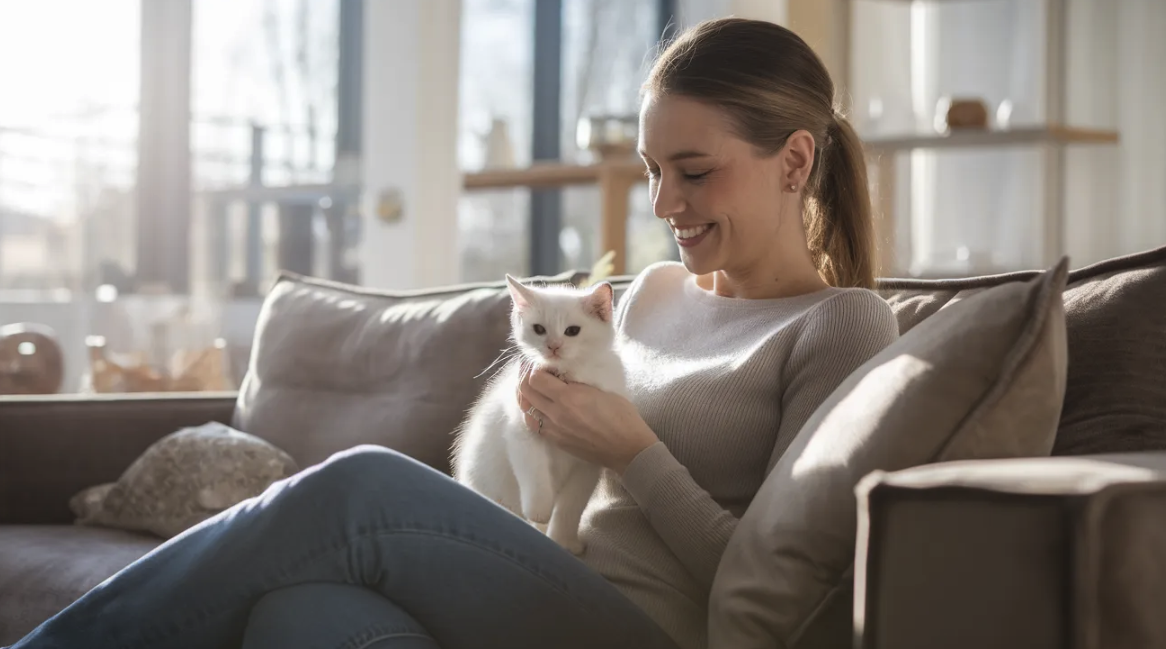
Kittens often swallow air while nursing or bottle-feeding, which can result in trapped gas, so it’s essential to sterilize the feeding equipment. This trapped air may cause discomfort and disrupt digestion. Therefore, knowing how to burp a kitten properly after feeding keeps it comfortable and healthy. Since kittens cannot burp on their own, learning how to burp them with gentle assistance helps a great deal.
Understanding how to burp them effectively helps release trapped air, promoting proper digestion and preventing bloating. The process is straightforward when done with care, especially for kittens under 4 weeks old. A calm environment and soothing touch are key to ensuring your young kitten feels safe and stress-free during burping.
Why Kittens Need to Be Burped
Understanding the Role of Burping
Burping plays an essential role in keeping your kitten comfortable after feeding. Kittens often swallow air along with their milk, and this trapped air can cause discomfort, bloating, or even mild pain. Unlike adult cats, kittens cannot burp independently because their esophageal muscles are still developing.
As a caregiver, you help release this air, ensuring your kitten feels relaxed and can digest its meal properly in their early weeks of life. Burping also prevents potential complications, especially in kittens under 4 weeks old. Without your assistance, the trapped air may lead to digestive issues or make your kitten fussy and restless, potentially causing diarrhea.
Learning to burp your kitten helps promote its health and well-being.
Common Feeding Scenarios That Cause Air Swallowing
Certain feeding situations increase the likelihood of air swallowing in kittens. Bottle-feeding kittens, for example, often leads to air intake if the bottle’s nipple is too large or the feeding angle is incorrect.
Similarly, a baby kitten nursing too quickly or competing with siblings for milk may gulp air in the process.
Overfeeding can also contribute to air swallowing, which may affect stool consistency. When a kitten overeats, it may struggle to digest its meal, trapping air in its stomach, which can lead to discomfort and affect its ability to urinate properly. Recognizing these scenarios helps you take preventive steps, such as adjusting feeding techniques or monitoring portion sizes.
Potential Risks of Not Burping a Kitten
Failing to burp your kitten can lead to several risks, including the need to help with elimination issues later on. Trapped air can cause bloating, making your kitten appear visibly swollen or uncomfortable. In severe cases, this bloating can press against internal organs, leading to pain or breathing difficulty.
A kitten that remains unburped may also experience feeding disruptions. The discomfort caused by trapped air can make it reluctant to eat during the next feeding session.
Over time, this could impact its growth and development. Addressing burping needs promptly ensures your kitten stays healthy and happy.
Preparing to Burp a Kitten
What You Need
Before burping your kitten, gather a few essential items to ensure the process is safe and comfortable:
-
A soft towel or blanket. Use this to support the kitten and keep it cozy during burping; a chill environment can also help.
-
A quiet and calm environment is essential for the well-being of your feline friend. Minimize noise and distractions to help the tiny kitten feel secure during its early life.
-
Gentle hands and a soothing demeanor: Handle the kitten with care and maintain a calm presence to avoid causing stress.
Having these items ready will make the process smoother and more effective.
Setting Up the Environment
Creating the right environment helps keep your kitten relaxed.
Choosing a safe, quiet space
Select a location where the kitten feels protected and comfortable. Avoid areas with loud noises or sudden movements. A quiet room or a corner away from household activity works well.
Ensuring the kitten feels secure
Hold the kitten gently but firmly to provide a sense of safety. Wrapping it in a soft towel can help mimic the warmth and comfort of its mother. This is especially helpful for a baby kitten that may feel vulnerable.
Getting the Kitten Ready
Proper preparation ensures the kitten remains comfortable throughout the process, making it easier to transition to weaning.
Checking the kitten’s comfort level
Observe the kitten for signs of distress or discomfort. If it seems restless, take a moment to calm it by speaking softly or stroking its back.
Gentle hold the kitten for burping
Support the kitten’s head and neck with one hand while cradling its body. This position prevents strain and keeps the kitten stable. For bottle-feeding kittens, burping during and after feeding is most effective. Use your free hand to gently pat or rub its back, paying attention to its reactions, as this is important in kitten care.
How to Burp Kitten: Step-by-Step Instructions
Positioning the Kitten
Proper positioning is the first step in learning how to burp kittens effectively. Holding the kitten correctly ensures its comfort and safety while helping release trapped air.
Over-the-shoulder method
Hold the kitten upright, similar to how you would hold a human baby. Support its head and neck with one hand while keeping its body at a slight incline. Rest the kitten gently against your shoulder, using your other hand to stabilize its body. This position allows gravity to assist in releasing trapped air.
Sitting upright in your lap
Place the kitten in your lap, keeping it in an upright position. Cradle its body with one hand, ensuring its head and neck are supported. Use your free hand to pat or rub its back gently. This method works well for bottle-feeding kittens or when you need more control over the process.
Gentle Techniques to Release Air
Once the kitten is in position, use gentle techniques to help it burp. These methods are safe and effective when done with care.
Light patting on the back
Use your fingertips to tap the kitten’s back lightly. Start with soft, rhythmic pats between its shoulder blades, which can be soothing for a small kitten. Avoid applying too much pressure, as kittens are delicate. Listen closely for any faint burping sounds or signs of gas release.
Gentle circular rubbing motions
Rub the kitten’s back in small, circular motions. Begin at the base of its neck and move downward toward its lower back. This technique helps stimulate the release of trapped air while keeping the kitten calm and comfortable, similar to how a mother cat would gently rub her young. Alternate between patting and rubbing if needed.
Monitoring the Kitten During Burping
Pay attention to the kitten’s behavior throughout the process. Monitoring its reactions ensures the burping experience remains stress-free.
Signs the kitten is comfortable
Look for signs that the kitten feels at ease. A calm and relaxed kitten indicates that your technique is working. You may hear a faint burping sound or notice the kitten releasing gas. These are clear signs of success.
Adjusting your technique if necessary
If the kitten appears restless or uncomfortable, adjust your approach. Try changing its position or using a different technique, such as switching from patting to rubbing, especially if the kitten is just a few weeks old. Patience is key, as some kittens may take longer to burp than others; don’t use excessive force.
Learning how to burp kitten involves practice and observation. With time, you’ll develop a routine that works best for you and your kitten.
Tips to Keep Your Kitten Stress-Free
Staying Calm and Patient
Your calm demeanor plays a significant role in keeping your kitten stress-free during burping. Kittens are sensitive to emotions and can pick up on tension or frustration. Staying calm reassures them and creates a sense of safety for the young kitten.
-
A calm approach allows you to focus on the process without rushing.
-
Patience ensures you give your kitten enough time to release trapped air, as some kittens’ needs vary.
-
Some kittens, especially bottle-feeding kittens, may need extra time or gentle assistance to burp effectively.
Remaining patient also helps you adjust your technique if needed. If your kitten doesn’t burp immediately, take a moment to pause and try again. This approach prevents unnecessary stress for both you and your kitten.
Using a Gentle and Soothing Voice
Speaking softly to your kitten during burping can make a big difference. A soothing voice helps create a comforting environment, which is especially important for a baby kitten that may feel vulnerable.
-
A gentle tone reassures your kitten and reduces anxiety.
-
It aligns with the overall gentle handling approach needed for burping.
-
Your voice can act as a calming tool, helping your kitten stay relaxed throughout the process.
You can say simple, reassuring phrases like “It’s okay” or “You’re doing great” while gently patting or rubbing its back. This not only soothes your kitten but also strengthens the bond between you.
Recognizing When to Pause and Reassess
Sometimes, your kitten may show signs of discomfort or restlessness during burping. Recognizing these cues is essential for maintaining a stress-free experience.
-
If your kitten squirms or cries, pause immediately and gently rub its back to help soothe it.
-
Check its position and ensure it feels secure.
-
Adjust your technique, such as switching from patting to rubbing motions.
Creating a stress-free environment also involves providing your kitten with safe spaces. Consider adding hiding spots or perches where it can retreat when overwhelmed.
These minor adjustments can greatly affect your kitten’s overall comfort and well-being.
Building Trust Through Consistent Care
Building trust with your kitten takes time and patience, especially during the weaning process. Every interaction you have with your kitten shapes its perception of you. When you handle it gently and meet its needs regularly, it associates you with safety and comfort. This trust is essential, especially when performing tasks like burping or feeding.
Start by creating a predictable routine for your kitten care, especially for newborn kittens. Feed your kitten at the same times each day and use the same quiet space for burping. Consistency helps your kitten feel secure. For bottle-feeding kittens, ensure the feeding process is calm and unhurried; never feed a kitten too quickly. Use a soothing voice and gentle touch to reassure your kitten during these moments.
Pay attention to it’s body language to understand when it needs to burp. A baby kitten may feel nervous or unsure at first. If it squirms or pulls away, give it a moment to relax.
Speak softly and hold it in a way that feels supportive. Over time, your kitten will learn to trust your hands and presence. Providing proper nutrition, like kitten milk, also plays a role in building trust. Use high-quality kitten formula to ensure your kitten stays healthy and satisfied. A well-fed kitten is more likely to feel content and cooperative during care routines.
Finally, spend time bonding outside of feeding and burping.
Play with your kitten using toys or simply sit with it in a calm environment. These positive interactions strengthen your relationship and make tasks like burping easier, much like human bonding experiences. Trust grows when your kitten feels loved and cared for consistently.
Signs of Successful Burping and When to Seek Help
How to Know the Kitten Has Been Burped
You can identify a successful burping session through a few clear signs. The most obvious indicator is an audible burp or the release of trapped air. This sound confirms that the kitten has expelled the gas causing discomfort.
Pay attention to subtle cues, as the burp may not always be loud.
Another sign is a noticeable change in its behavior. After burping, the kitten often appears more relaxed and at ease. It may stop squirming or crying and settle into a calm state. These signs show that the kitten feels more comfortable and ready to rest or continue its activities.
When to Consult a Veterinarian
Sometimes, burping may not resolve the kitten’s discomfort. If you notice persistent bloating or signs of distress after feeding, and if your kitten shows signs of diarrhea, it’s essential to seek veterinary help.
Parasites are a common issue in kittens and can cause bloating or discomfort, making proper kitten care essential. A veterinarian can examine the kitten, check for parasites, and provide the necessary treatment to address the problem. Difficulty burping despite multiple attempts is another reason to consult a vet. This could indicate an underlying issue that requires professional attention.
FAQ
How often should you burp a kitten?
You should burp your kitten after every feeding session. If the kitten consumes a large meal or feeds quickly, consider burping it midway through the feeding while ensuring its body temperature remains stable. This helps release trapped air and prevents discomfort, which can be life-threatening if not addressed.
What if the kitten doesn’t burp?
If the kitten doesn’t burp after a few minutes, let it rest for a while and offer warm water to aid digestion. Try burping your kitten again later when it is more relaxed and in a warm shelter. Persistent bloating or discomfort may require a veterinarian’s attention to rule out underlying issues.
Can burping hurt the kitten?
Burping won’t harm the kitten if done gently. Use light pats or rubs on its back and avoid applying pressure. Always monitor the kitten’s reactions to ensure it remains comfortable during the process.
Is it normal for kittens to cry during burping?
Some kittens may need to burp more frequently than others, particularly those that are bottle-fed with kitten milk replacement. cry if they feel insecure or uncomfortable. Pause immediately and check its position. Speak softly and adjust your technique to reassure the kitten. Crying could also indicate other issues, so observe its behavior closely.
Do all kittens need to be burped?
Most bottle-fed kittens need burping due to air intake during feeding, especially if they are using a hole in the nipple that allows for faster flow. Nursing kittens may also require burping if they feed too quickly. Monitor your kitten for signs of bloating or discomfort to determine if burping is necessary.

In her previous life, Lisa traveled extensively, both for work and leisure. After the pandemic struck, Lisa locked up her luggage and adopted a cat ever since.
Lisa is now an avid cat lover, she devotes most of her free time serving as butler to her adorable feline at home. When she is not with her cat, she can be seen using her phone sourcing for the latest cat supplies online.


